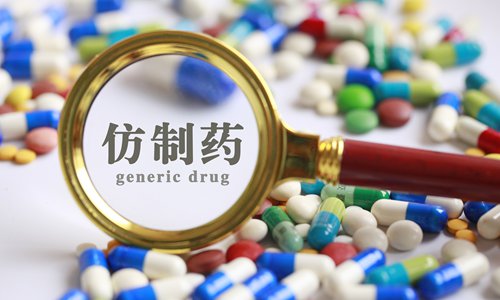HOME >> BUSINESS
Generic drugs get government boost in China
By Chi Jingyi Source:Global Times Published: 2019/10/13 20:48:40
Move aims to ensure supplies, lower prices to improve insurance coverage

File photo: IC
China has announced the first 33 generic drugs that will be involved in a drive to ensure the supplies and stabilize the prices of shortage-prone pharmaceutical products. Analysts said the move will reduce the cost of medical treatment and allow medical insurance to offer wider coverage.
The 33 medicines are all those on which the patents have expired or are about to expire in China, and for which producers have not yet applied for registration in the intellectual property office. There are shortages of these drugs, either because of insufficient competition or because the producers have made such a declaration.
The 33 items include drugs to treat cancer, Parkinson's, high cholesterol, pediatric ailments and rare diseases.
To ensure supplies, China will take steps including making a list of medicines in shortage, and establishing and improving inventories of these drugs, according to a statement the State Council, China's cabinet, posted on Friday on its website.
The statement was in line with an earlier document on ensuring the supply of generic drugs, which was published by several agencies including the National Health Commission, the Ministry of Science and Technology, the Ministry of Industry and Information Technology, the National Medical Products Administration and the National Intellectual Property Administration.
The first section of a catalogue of generic drugs, covering the 33 items, has been compiled, according to a document released on Wednesday.
"For a long time, patented drugs with very good therapeutic effects in clinical practice have often had a patent period of 10 to 15 years in China. As a result of investments in research and development (R&D), the cost of these patented drugs is often expensive, with a single tablet worth as much as tens or even hundreds of yuan," an official from the Beijing Municipal Intellectual Property Office, speaking anonymously and in a private capacity, told the Global Times on Sunday.
"Moreover, no other company can produce and sell such 'exclusive' drugs during the patent period. Therefore, China's medical insurance system is under great pressure to pay for branded, patented drugs," the official noted.
After the generic versions come to market, costs will surely plunge as the average prices of generic drugs are only 20-40 percent those of patented versions. In some cases, generics only cost 10 percent as much as branded drugs, the Guangzhou Daily reported on Saturday.
According to industry estimates, a shift from branded products to generic ones can save tens of billions of yuan every year for national healthcare costs, reported the Guangzhou Daily.
"When drugs go off-patent in China, other companies can produce similar drugs. Generics eliminate the R&D process, making them cheaper than branded drugs. That means China's medical insurance system can cover more patients and it will be cheaper for people to take medicine," said the official.
"There are strict standards for drug companies to produce generic drugs, which have to be the same as branded drugs in terms of dosage form, safety, strength, route of administration, quality, performance characteristics and intended use," Song Hongxing, deputy director of spinal surgery at Beijing Shijitan Hospital, told the Global Times on Sunday.
Song said that the price of drugs used in spinal surgery was already affordable with China's medical insurance, which was a result of a precious policy announced by the State Council in April 2018.
China vowed to promote R&D of generic drugs to solve the problem of shortages of high-quality generic drugs and to secure drug supplies, said the State Council in a guidance. China will make a list of medicines that are encouraged to be produced as generic drugs, which will be included in the national science and technology plan, and priority will be given to the review and approval of their registration applications.
Posted in: INDUSTRIES